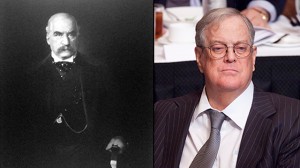In the very first episode of Moyers & Company, Bill talked with authors Jacob Hacker and Paul Pierson about the problem of income inequality in America and the growing divide between America’s rich and poor. It’s an issue that Bill has returned to many times this year.
In today’s New York Times, Thomas B. Edsall writes about a Northwestern University economist’s research paper that takes a look at the future of this trend from an economic perspective.
Robert J. Gordon hypothesizes that after three industrial revolutions — steam and railroads (1750 to 1830), electricity (1870 to 1900), and computers (1960 to present) — it’s unlikely that America will experience a fourth economic revolution.“Why is this related to inequality?” asks Edsall, analyzing Gordon’s essay for The New York Times’ Campaign Stops blog. “Because the burden of this decline will fall on the bulk of the population. The continuing prosperity of the wealthiest, on the other hand, will be magnified. …
“Affluent Republicans – the donor and policy base of the conservative movement — are on red alert. They want to protect and enhance their position in a future of diminished resources. What really provokes the ferocity with which the right currently fights for regressive tax and spending policies is a deeply pessimistic vision premised on a future of hard times. This vision has prompted the Republican Party to adopt a preemptive strategy that anticipates the end of growth and the onset of sustained austerity – a strategy to make sure that the size of their slice of the pie doesn’t get smaller as the pie shrinks.
This is the underlying and inadequately explored theme of the 2012 election.”
You can read Gordon’s full paper on Northwestern’s website, and Edsall’s post (including the counter-arguments of other economists) on the Times’ Campaign Stops blog. Going into the last two debates, the conversation it sparks among economists is worth reading.


